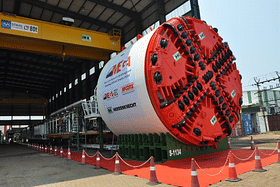The TBM to be deployed will have a diameter of 13.1 metre, making it even larger than the country’s previous largest TBM used for the Mumbai Coastal Road project.
India’s largest Tunnel Boring Machine (TBM) will be used for the Mumbai-Ahmedabad bullet train project for the construction of the country’s first undersea rail tunnel.
Widely considered a key project highlight, the 21 km tunnel will be constructed at Thane Creek between underground stations at Bandra-Kurla Complex and Shilphata in Maharashtra, which are around 35 kilometre apart.
The TBM to be deployed will have a diameter of 13.1 metre, making it even larger than the country’s previous largest TBM used for the Mumbai Coastal Road project.
Afcons Infrastructure Ltd, a company involved in various underground projects in India, will be deploying a total of 20 TBMs this financial year. Seventeen TBMs are already being mobilised in various locations and three more will be used early next year.
Afcons is currently the only organisation in India that owns and deploys this many TBMs at the same time.
The National High-Speed Rail Corporation Limited recently awarded a project to Afcons to build India’s first undersea rail tunnel.
To construct the seven-km-long undersea tunnel under Thane Creek, 16 km of the tunnel will be executed using TBMs while the remaining 5 km will be constructed using the new Austrian Tunnelling Methodology.
Afcons, with its experience in executing underwater tunnelling projects, has the necessary credentials to handle the undersea portion of the tunnel. The pressure from the water in the inter-tidal zone might be high, which could result in a very high overburden.
However, Afcons has successfully constructed the first underwater Metro tunnels under the river Hooghly in Kolkata. This was accomplished by building three Metro stations underground, connecting them with two tunnels of 3.8 kilometres. Thus, Afcons has demonstrated its expertise in executing underwater tunnels.
The alignment of the Mumbai-Ahmedabad tunnelling package passes through a highly urbanised area, making it a challenging aspect of the project. Underground tunnelling has its unique difficulties in this terrain, and even the shaft excavations pose a challenge since they could be at depths exceeding 50 metre, as claimed by Afcons.
The project thus involves a complex web of challenges that Afcons is determined to overcome.
India’s First Undersea Tunnel
The rail route between Mumbai and Thane on the northern side will be a key attraction, with a considerable portion featuring Thane Creek Flamingo Sanctuary (TCFS), which was recognised as a Ramsar Site in August 2022.
The MAHSR corridor will run through a 7 km undersea tunnel in this sector to prevent disturbing the flamingos at the TCFS location and other species in the adjacent rich mangroves.
It will be India’s first undersea tunnel and the country’s longest rail transport corridor, with a single tube measuring 13.1 m in diameter.
This tunnel will be about 25-65 m deep from the ground level and the deepest construction point will be 114 m below the Parsik Hill near Shilphata.
Building an underground tunnel, however, has escalated the cost by 100 times. The initial cost of the C2 package which was pegged at Rs 100 crore has now increased to Rs 10,000 crore.
India’s First Bullet Train Project
Presently, MAHSR is the only sanctioned high-speed rail project in the country.
The high-speed rail operating at 320 kmph will traverse along west India’s landscape, covering a 508.17 km distance between Mumbai and Ahmedabad in just about two hours. This will save time compared to the current travel time between the two terminal stations by about nine hours (by bus) or six hours (by conventional railways).
It will cover 155.76 km in Maharashtra, 4.3 km in the Union Territory of Dadra and Nagar Haveli and 348.04 km in Gujarat, with 12 stations en route.
The first trial run of MAHSR project, is scheduled for August 2026 between Surat and Bilimora (63 km).
The government is yet to determine a final deadline for the entire project.


